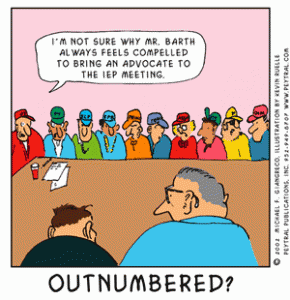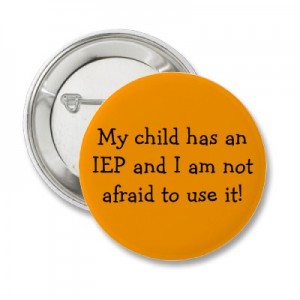Unless your child regularly sees a private speech-language pathologist (SLP) in addition to his school SLP, you’re probably wondering how to keep him in speech therapy sessions throughout the summer. Of course, there are plenty of communication-related activities that you can do with your child yourself, whether you’re planning to stay at home for the summer or hit the road and take a volunteer vacation. (Check out later posts this week for fun ideas for summer speech therapy.) Another option is to request extended school year (ESY) services.
Getting Organized: Managing the IEP Paperwork
Individualized Education Program (IEP)As the parent of a child with a speech disorder or delay, you handle entirely too much paperwork. Insurance forms, speech therapy bills, evaluations, recommendations, Individualized Education Program (IEP) meeting notes…. the list is unending. It’s best to get organized right off the bat – that single folder full of documents will quickly overflow. If you are already working your way through the IEP process, you may need to devote a Saturday afternoon to getting organized.
How to File a Complaint
Individualized Education Program (IEP) Legal IssuesThere are many different situations that call for the filing of a complaint under the Individuals with Disabilities Education Act (IDEA). If you believe that your school district has failed to meet its IDEA obligations or has grossly violated your child’s rights, file an official complaint within a year of the violation.
Advocating for Your Child
Individualized Education Program (IEP) Legal IssuesIt can be overwhelming when your child is diagnosed with a speech disorder. You’re probably facing mountains of insurance forms and Individualized Education Program (IEP) paperwork. In all likelihood, the last thing you have time for is a parent support group. However, support groups for parents of special needs children not only provide emotional help, they’re also a great networking opportunity. Networking is an important component of advocating successfully for your child. School districts may be more likely to heed the concerns of a group of parents. Plus, you can take advantage of the knowledge and experience of other parents with special needs children.
Should You File a Complaint?
Individualized Education Program (IEP) Legal IssuesIn all likelihood, as the parent of a child with a speech disorder, you’re going to be working closely with the school district for years. It’s in your child’s best interests for you and the school representatives and educators to work together cooperatively. This does not mean that you should ignore violations of regulations or your child’s rights for the sake of avoiding confrontation, however.
Collaboration vs. Pull-Out Speech Therapy
Individualized Education Program (IEP) Speech Therapy Techniques
Image source: speakandwrite.com.au
What is Pull-Out Speech Therapy?
The pull-out model of speech therapy refers to taking a child out of his usual classroom for speech therapy. This could mean either a group session or one-on-one work with the speech-language pathologist (SLP). For example, your child’s Individualized Education Program (IEP) might specify that he will receive two 30-minute speech therapy sessions per week. Using the pull-out model, he will leave his regular classroom to go meet with the speech therapist during these times.
After the IEP Hearing: What’s Next
Individualized Education Program (IEP) Legal IssuesAfter the exhausting ordeal of an Individualized Education Program (IEP) hearing, it’s tempting to hibernate on the couch watching reruns or playing with Pinterest to decompress. Unfortunately, your work is not yet over.
What to Expect During an IEP Hearing
Individualized Education Program (IEP) Legal IssuesWhile a due process hearing for an Individualized Education Program (IEP) is a legal procedure, it is also different from a typical court case. It will not be held in a courtroom. Instead of a judge and jury, a hearing officer is responsible for examining the evidence, hearing testimony, and making a binding decision. The hearing officer may not be employed by the school district – he is a neutral third party.
How to Prepare for an IEP Hearing
Individualized Education Program (IEP) Legal IssuesDisagreeing with an IEP
If you disagree with your child’s Individualized Education Program (IEP), you can try to negotiate with the IEP team to reach a compromise. You may reject the proposed compromise if you feel that it does not serve your child’s best interests. If negotiation fails, the next step is to file a formal complaint with your state’s Department of Education. Assuming that the state agrees to hear your complaint, you will have the opportunity to present your argument before a due process hearing. It’s recommended that you retain an attorney for the hearing.
How to Disagree with an IEP
Individualized Education Program (IEP) Legal Issues
Image source: eiwelcome.com
What is an IEP?
Your child’s Individualized Education Program (IEP) is a written document that details the services he will receive within the public school system under the Individuals with Disabilities Education Act (IDEA). You and a team of professionals will write the IEP during your IEP meeting.








